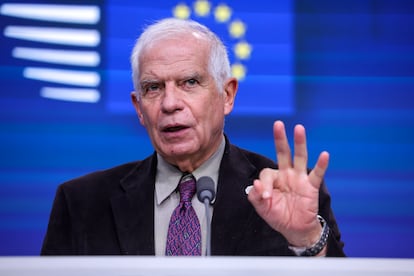EU warns that Rafah crossing is not allowing enough humanitarian aid into Gaza
At a meeting with foreign ministers, EU’s chief diplomat Josep Borrell discussed a roadmap for the future of the Palestinian enclave, stating that the 27-member bloc ‘has been far too absent’


The situation in the Gaza Strip, besieged by Israel in response to the Hamas attacks of October 7, has become critical. However, the European Union has not agreed to demand a ceasefire due to the categorical opposition of Austria and, to a lesser extent, Germany and the Czech Republic. Instead, the 27-member bloc demanded on Monday “immediate pauses” in hostilities so that humanitarian aid can reach Gaza.
As Israel’s offensive in Gaza continues, the EU has begun discussing what will happen to the Palestinian enclave after the war with Hamas comes to an end. At a meeting of EU foreign ministers in Brussels on Monday, the EU’s chief diplomat Josep Borrell discussed several proposals for the post-war horizon that would require the collaboration of the U.S., the U.N. and Arab countries.
“We need to focus on a medium and longer-term solution, a post-conflict scenario that can guarantee stability on an ongoing basis that will make it possible to build peace between Palestinians and Israelis and throughout the region,” Borrell told reporters after the talks.
The European Commission announced that it will quadruple humanitarian aid for Palestinians, with €100 million ($107 million) to be allocated to helping civilians in the enclave. But the issue is how to get the aid into Gaza. On Monday, Borrell warned that the Rafah border crossing in Egypt — which is the only one open — is not enough to meet Gaza’s humanitarian needs.
“We have got to get the humanitarian trucks through. We are currently talking about 40 trucks a day on the Rafah crossing and that is very little compared to the 500 trucks a day crossing before the war,” said Borrell, who spoke of the need for more entry points and the possibility of opening a maritime corridor to channel aid, a proposal that came from Cyprus.
According to the Health Ministry of Gaza, which is governed by Hamas, more than 11,200 people have died in Gaza due to bombings from the Israel Defense Forces (IDF) bombings. Israel has been attacking the enclave since the Hamas attack on October 7, which killed 1,200 people, mostly Israeli civilians.
Spain — one of the few EU countries to call for a ceasefire — will host a meeting of the Union for the Mediterranean at the end of November. It hopes that Palestinian and Israeli representatives will attend the forum, and that the event will be able to advance future solutions for Gaza.
Roadmap
Borrell will travel to Israel and Palestine on Wednesday and then visit Bahrain, Saudi Arabia, Qatar and Jordan to discuss the entry of humanitarian aid into Gaza and other political issues. In the press conference on Monday, Borrell said that he and the EU foreign ministers had discussed a roadmap for the post-war horizon.
“We think that there has to be ‘yes’ to a Palestinian authority, one Palestinian authority, so a Palestinian authority with a legitimacy to be defined and decided upon by the [U.N.] Security Council,” he said, pointing out that this does not have to be the Palestinian Authority that currently governs the West Bank.
“It’s understandable that the Palestinian Authority doesn’t want to enter Gaza, on top of an Israeli tank,” he added. Israel opposes the idea of the Palestinian Authority playing a role in the future of Gaza.
Borrell also said that the EU must play a greater role, especially in terms of the reconstruction effort. “We have been far too absent, we have delegated this solution to the U.S., but now the EU must be more involved because if we don’t find a solution we will experience a perpetual cycle of violence from generation to generation and funeral to funeral,” he said.
According to the roadmap, there would be no forced displacement of Palestinians from Gaza or Israeli re-occupation. “The loss of Israeli and Palestinian lives shows the moral political failure of the international community,” said Borrell.
Sign up for our weekly newsletter to get more English-language news coverage from EL PAÍS USA Edition
Tu suscripción se está usando en otro dispositivo
¿Quieres añadir otro usuario a tu suscripción?
Si continúas leyendo en este dispositivo, no se podrá leer en el otro.
FlechaTu suscripción se está usando en otro dispositivo y solo puedes acceder a EL PAÍS desde un dispositivo a la vez.
Si quieres compartir tu cuenta, cambia tu suscripción a la modalidad Premium, así podrás añadir otro usuario. Cada uno accederá con su propia cuenta de email, lo que os permitirá personalizar vuestra experiencia en EL PAÍS.
¿Tienes una suscripción de empresa? Accede aquí para contratar más cuentas.
En el caso de no saber quién está usando tu cuenta, te recomendamos cambiar tu contraseña aquí.
Si decides continuar compartiendo tu cuenta, este mensaje se mostrará en tu dispositivo y en el de la otra persona que está usando tu cuenta de forma indefinida, afectando a tu experiencia de lectura. Puedes consultar aquí los términos y condiciones de la suscripción digital.








































